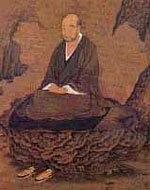Koso Wasan 23
The lord of the mundane world came to inquire
Why he aspired for the Pure Land:
'All Buddha realms throughout the ten quarters are pure;
Why do you turn to the land in the west?'
Enter! The Privileged and Powerful

You will remember that towards the end of my comments on the previous verse I suggested that one of the clues to T'an-luan's consciousness of the spiritual needs of ordinary people - and the relevance of the dharma for them - is his attention to the influence of Amida Buddha. Of course, we need look no further than the Larger Sutra itself for a reference to the nature of Amida Buddha's dharma. A good example of this is to be found in the Juseige - the Song of Repeated Vows. This hymn comes just after the proclamation of the forty-eight Vows of Amida Buddha and is still recited by Pure Land followers, most often used as an evening sutra chant each day, for it suggests a commendation of one's task in life; a small form of vow (Sk. pranidhana) - a sigh after much effort.
If I should not become a great benefactor
In lives to come for immeasurable kalpas
To save the poor and afflicted everywhere,
May I not attain perfect enlightenment.1
As a living Buddha, Amida - infinite light, is the form of wisdom (Sk. prajna). If we look closely at the prajñaparamita literature - especially the Larger Sutra of the Perfection of Wisdom in 80,000 Lines - we shall encounter the way in which a person who lives the way of the perfection of wisdom is entirely free of all discrimination in his or her personal relationships. This is tantamount to an expression, too, of Amida Buddha's compassion, although it is recounted as the practice of a bodhisattva's compassion in the literature:
When a bodhisattva does not apprehend or take notice of body, speech or mind, the status of a being, whether bodhisattva, pratyekabuddha, arhat, shravaka or just an ordinary being, then that bodhisattva has set a course to Enlightenment, which is, the non-apprehension of all dharmas.
When a bodhisattva gives a gift, he does not see one who gives nor does he see one who receives his gift.
Such passages are peppered throughout the prajñaparamita literature - the spiritual nourishment to which T'an-luan would have had constant recourse.
This identical sensibility inspires Shinran Shonin's shinjin. In the Kyo Gyo Shin Sho, he exclaims:
In reflecting on the ocean of great shinjin, I realise that there is no discrimination between noble or humble or black-robed monks and white-robed laity, no differentiation between man and woman, old and young. The amount of evil one has committed is not considered, the duration of any performance of religious practice is of no concern.2
This cry of realisation comes from the truth of the prajñaparamita, the Perfection of Wisdom, the form of the inconceivable light, which is Amida Buddha.3
In the previous verse of the Koso Wasan, then, T'an-luan is characterised as leading 'the common people, bound by their evil passions' to nirvana in his compassionate teaching. In contrast, this verse of the wasan tells us that T'an-luan also encompassed the rich and powerful. Although, in terms of spiritual poverty we are all equally bereft, whether rich or poor, powerful or bound to servitude, these two verses also hint at social status. In terms of the dharma, of course, an 'emperor of the secular world' is not the 'Prince of Heaven' that he might consider himself to be, but one of 'the common people, bound by their evil passions'. In any case, the point is that social status is essentially a fiction carried within our deluded minds but, unfortunately, it is frequently associated with questions of 'worth'. Shinran dismisses such considerations when he asserts that shinjin does not discriminate between 'the noble or the humble'.
One of the most charming and endearing things about T'an-luan (as we can see in his commentary on the Jodo Ron of Vasubandhu) is his extraordinary compassion for all people, whether noble or poor. He was surely a great and enlightened sage. Although we in no way compare with him, it is probably worth remembering that those who realise Amida Buddha's shinjin are imbued by Other Power with wisdom - not of their own generation - but by the Perfection of Wisdom, Amida Buddha's enlightenment. Though their minds are clouded by their bonno, people of shinjin are clearly disinclined to judge others as 'good' or 'bad'. We see this in Shinran's exhortations to his followers.
This non-discriminatory awareness is potentially very subversive of the status quo, whereby we are inclined to see ourselves in terms of categories and classification; we tend to discriminate and to set ourselves apart from others. Nevertheless, shinjin is the way in which the deep insights of the Madhyamika are played out in daily life and in the hearts and minds of ordinary people. That is why non-discrimination ought to be the core disposition of Shinshu followers in their relations with others.
1: TPLS, p. 20.
2: CWS p. 107.
3: CWS, p. 486.